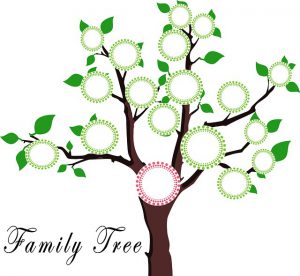Genealogy on a Budget
Have you ever wanted to discover your origins and find the stories of your ancestors?
Has your grandmother told you family stories that sound a bit too good to be true?
 Researching your family history is a rewarding journey that connects you to your roots. It provides you with a deeper understanding of your heritage. However, many believe genealogy to be expensive with subscriptions, DNA tests, and professional genealogist fees. In a cost of living crisis, an expensive hobby may seem like too much of a luxury.
Researching your family history is a rewarding journey that connects you to your roots. It provides you with a deeper understanding of your heritage. However, many believe genealogy to be expensive with subscriptions, DNA tests, and professional genealogist fees. In a cost of living crisis, an expensive hobby may seem like too much of a luxury.
Today I will show you that it is possible to discover your family tree without breaking the bank. With a little creativity, resourcefulness, and the right tools, you can navigate the world of genealogy on a budget. So, let's dive in and explore the wonderful world of affordable genealogy - the place where the past meets the present, and you can unlock your family's history without spending a fortune.
You can also head over to Resources on my website for more tips on undertaking your research.
What is the difference between genealogy and family history?
Genealogy and family history are closely related fields that involve the study and exploration of a person's ancestry and lineage. While they are often used interchangeably, there are slight differences between the two. Genealogy, or a family tree, typically traces the direct lineage and connections between people. It relies on vital records—birth, marriage, and death certificates—as well as census records, immigration records, and other historical documents.
Family history, on the other hand, has a broader scope and explores not only the lineage but also the lives and stories of the family. It puts the family in time and place within a broader historical context; for example, what would life have been like in 1942 during wartime in Perth, Western Australia, and how that would have impacted your family. In a family history, you would be hoping to preserve the oral stories, photographs, letters, diaries, and other personal artifacts of your family.
In summary, genealogy is focused on establishing direct lineage and biological connections through the construction of family trees, while family history aims to capture a broader picture of an individual's ancestors by delving into their lives, experiences, and cultural context. While the two fields overlap, family history provides a more holistic view of a family's past.
The importance of tracing your genealogy and family history
Tracing genealogy and family history holds significant importance for individuals and communities alike. Here are some reasons why they are valuable:
-
 Personal Identity: Understanding one's genealogy and family history helps establish a sense of personal identity and belonging. Knowing where we come from provides a deeper understanding of our roots, cultural heritage, and the values that have been passed down through generations. It can contribute to a stronger sense of self and help shape our identity.
Personal Identity: Understanding one's genealogy and family history helps establish a sense of personal identity and belonging. Knowing where we come from provides a deeper understanding of our roots, cultural heritage, and the values that have been passed down through generations. It can contribute to a stronger sense of self and help shape our identity.- Connection to Ancestors: Exploring genealogy allows us to establish a connection with our ancestors. It enables us to learn about their lives, experiences, and achievements. Discovering stories of resilience, hardship, or triumph can inspire and motivate us, providing a sense of connection and continuity across generations.
- Family Health History: Knowledge of our family's medical history can have significant implications for our health. Certain genetic conditions and diseases can be hereditary, and understanding our family's health background can help identify potential risks and take proactive steps for prevention or early detection. It empowers individuals to make informed decisions about their healthcare.
- Cultural and Historical Perspective: Tracing family history provides insights into the broader cultural and historical context in which our ancestors lived. It allows us to explore the customs, traditions, and migrations that have shaped our family's story. Understanding our heritage and cultural background contributes to a broader appreciation of history and the diversity of human experiences.Preservation of Family Legacy: By documenting and sharing family history, we preserve the stories, traditions, and achievements of our ancestors for future generations. It ensures that knowledge and heritage are not lost or forgotten. Sharing family history can strengthen family bonds and create a sense of pride and unity among relatives.
- Bridging Generations: Studying genealogy creates opportunities for intergenerational connections. It encourages conversations between older and younger family members, fostering a sense of appreciation, understanding, and respect across different generations. Younger individuals can learn from the wisdom and experiences of their older relatives, building stronger family ties.
- Uncovering Surprises and Discoveries: Tracing family history often leads to unexpected discoveries. It may uncover hidden stories, connections to historical figures, or relatives previously unknown. Such surprises can be exciting and enriching, offering a new perspective on our personal narratives and the world around us.
Overall, genealogy and tracing family history have immense significance in understanding ourselves, connecting with our roots, and appreciating the journey of our ancestors. It strengthens our sense of identity, provides insights into our heritage, and creates a lasting legacy for future generations.
Misconception that genealogy is expensive
There can be a misconception that genealogy is an expensive hobby, but this is not necessarily the case. The cost of genealogy research can vary depending on several factors, including the resources and services you choose to use.
 Many basic genealogy resources are available for free or at a low cost. Online platforms such as FamilySearch, Findmypast, and Ancestry offer access to extensive collections of records, family trees, and research tools without requiring a substantial financial investment. Local libraries, genealogy societies, and archives often provide free access to genealogical records and databases as well. Findmypast and Ancestry.com have revolutionised how genealogists undertake research, with many resources digitised. It is certainly cheaper to have a subscription than to travel to the other side of the world to visit an archive where the original document is held!
Many basic genealogy resources are available for free or at a low cost. Online platforms such as FamilySearch, Findmypast, and Ancestry offer access to extensive collections of records, family trees, and research tools without requiring a substantial financial investment. Local libraries, genealogy societies, and archives often provide free access to genealogical records and databases as well. Findmypast and Ancestry.com have revolutionised how genealogists undertake research, with many resources digitised. It is certainly cheaper to have a subscription than to travel to the other side of the world to visit an archive where the original document is held!However, some specialised or advanced genealogy services, such as DNA testing, access to certain historical records, or hiring professional researchers, can involve additional expenses. DNA testing kits, for example, typically come with a fee, and accessing specific historical records might require payment or subscription fees for certain websites or archives. The purchase of birth, marriage, and death certificates can also add up.
It's important to note that the cost of genealogy can vary greatly depending on the depth and complexity of your research goals. Some individuals may choose to invest more in their genealogical pursuits, while others may opt for a more budget-friendly approach. Ultimately, genealogy can be as affordable or as expensive as you make it, depending on your preferences and resources.
Start with free family history research
Starting with free resources for genealogy research is a great way to begin your journey into uncovering your family history. While there are numerous paid genealogy websites and databases available, there are also several free resources that can provide you with valuable information. Here are some steps to get started:
-
- Begin with yourself and your immediate family: Start by gathering information about yourself, your parents, grandparents, and other close relatives. Document their names, birth dates, marriage dates, and any other relevant details.
- Interview relatives: Speak with older family members who may have knowledge about your ancestors. They can provide valuable information, stories, and clues about your family history.
- Create a family tree: Organise the information you have gathered into a family tree. You can create one manually on paper or use genealogy software or online platforms that offer free family tree creation tools.
 Utilise online genealogy communities: Join online genealogy forums and communities where experienced researchers can help you with your queries and provide guidance. Some popular platforms include FamilySearch Community, WikiTree, and Genealogy.com.
Utilise online genealogy communities: Join online genealogy forums and communities where experienced researchers can help you with your queries and provide guidance. Some popular platforms include FamilySearch Community, WikiTree, and Genealogy.com.- Utilise government resources: Government websites often provide access to essential records, such as birth, marriage, death, and census records. Explore national and regional government archives and databases to find relevant information.
- Leverage social media and online communities: Genealogy-focused groups on social media platforms like Facebook or specialised genealogy forums can be helpful in connecting with others researching similar family lines. You may find distant relatives or people with shared interests who can assist you in your research.
- Explore free genealogy websites: There are several websites that offer free access to genealogy records and resources. Some notable examples include:
- FamilySearch: Operated by The Church of Jesus Christ of Latter-day Saints, it provides free access to a vast collection of genealogical records, including birth, marriage, death, census, and immigration records from around the world.
- MyHeritage: While MyHeritage offers a subscription-based service, it also provides access to some basic features and records for free. You can search their database for birth, marriage, death, and census records.
- Findmypast: Findmypast offers free access to certain records and resources, particularly those related to historical British genealogy. You can search for birth, marriage, death, and census records.
- Cyndi's List: Cyndi's List is a comprehensive directory of free genealogy resources on the internet. It covers various topics and regions, making it a valuable starting point for your research.
- FreeBMD is a project aiming to transcribe the Civil Registration index of births, marriages, and deaths for England and Wales. This is an ongoing volunteer project, so there are many more records to index, but it is a great place to start to find these vital records.
- FreeREG is another volunteer project that is transcribing baptism, marriage, and burial records from parish registers in England and Wales. New records are constantly being uploaded, so returning to check periodically may result in you finding that elusive record.
- Visit local archives and libraries: Many local archives and libraries hold genealogical records that can be accessed for free. Check with your nearest library or historical society to see what resources they have available. Some libraries even have access to Ancestry and Findmypast for free while you are using their computers.
 Remember to keep organised notes, record your sources, and verify information using multiple sources whenever possible. As you progress, you may consider investing in paid genealogy resources to access more extensive databases and specialised records.
Remember to keep organised notes, record your sources, and verify information using multiple sources whenever possible. As you progress, you may consider investing in paid genealogy resources to access more extensive databases and specialised records.Head over to Findmypast to start your genealogy journey today!

Leave a Reply